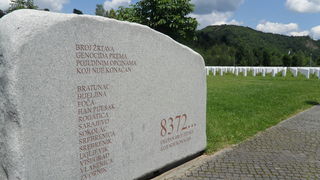Spirituality
Why Genocide Matters
Are we any closer to making "never again" a reality?
Posted June 20, 2016

The decision to exterminate a group of people is the extreme end of a continuum that lies beyond proclamations that they cannot live, worship, or love as they see fit and beyond decisions to ghettoize them or force them out of your country. In his landmark work on the Holocaust, Raul Hilberg writes of this continuum in the destruction of the European Jews: “The missionaries of Christianity had said in effect: You have no right to live among us as Jews. The secular rulers who followed had proclaimed: You have no right to live among us. The German Nazis at last decreed: You have no right to live.”
In the twentieth century this form of destruction would come to be called “genocide,” but it is not a modern phenomenon. The human reality of genocide predated its semantic taxonomy. As Leo Kuper, one of the pioneers in genocide studies, said, “The word is new, the concept is ancient.” From the Hittites to the Greeks to the Romans to the Mongols to the Albigensian Crusades to the witch hunts in Europe to colonial destructions of indigenous peoples throughout the world, human history has been replete with cases of mass destruction. In modern times, however, we have gotten very good—in a morally inverted sense of the word—at committing genocide. Aptly dubbed the “Age of Genocide,” the past century saw a massive scale of systematic and intentional mass murder coupled with an unprecedented efficiency of the mechanisms and techniques of mass destruction. Genocidal death rates worldwide— 7,700 per 100,000—were an eight-fold increase over the previous 69 centuries. On the historical heels of the physical and cultural genocide of North American indigenous peoples during the nineteenth century, the twentieth century writhed from the near- complete annihilation of the Hereros by the Germans in Southwest Africa in 1904; to the brutal assault on the Armenian population by the Turks between 1915 and 1932; to the implementation of Soviet manmade famine against the Ukrainian Kulaks in 1932–1933 that left several million peasants starving to death; to the extermination of two-thirds of Europe’s Jews during the Holocaust of 1939–1945; to the massacre of approximately half a million people in Indonesia in 1965–1966; to genocide or mass killings in Bangladesh (1971), Burundi (1972), Cambodia (1975–1979), East Timor (1975–1979), Argentina (1976–1983), Guatemala (1980s–1990s), Sri Lanka (1983–2009), Iraq (1987–1988), the former Yugoslavia (1992–1995), and Rwanda (1994).
Although this list is not exhaustive, it certainly suggests the universality of the potential—perhaps even the ubiquity of the reality—for genocide. It is clear that genocide cannot be confined to one culture, place, or time in modern history. Even the most restrictive of definitions estimates that at least 60 million men, women, and children were victims of genocide and mass killing in the past century alone. On the upper end, political scientist Rudolph Rummel argues that close to 170 million civilians were done to death by their own governments in the twentieth century. Even for those who survive, genocide is a collective trauma, a redefining destruction that shatters their assumptive world and transforms societies for generations.
Unfortunately, the first decades of the twenty-first century have brought little light to the darkness as a variety of international watch lists suggest that close to 20 countries are currently “at risk” for genocide. As former U.S. Secretary of State Hillary Clinton suggested, the “wood is stacked” in those countries and we cannot passively wait for the “match to be struck.” Because once the firestorm of genocide is at full blaze, history shows us that death comes in conflagrations of hundreds of thousands and the options for responding are difficult and costly. To borrow the words of Kofi Annan, former Secretary-General of the United Nations, genocide and other large- scale attacks on civilians are “problems without passports.” That is, they are global problems that transcend not only countries and regions, but the capabilities and resources of any one nation or sector. In many regards, genocide can take rightful claim as the most pressing human rights problem of the twenty-first century.
This blog is grounded in the belief that the world as it is now is not the world as it has to be. As ubiquitous as genocide seems, it is a human problem and, as such, has a human solution. This is not a quixotic utopian statement about human perfectibility. It simply is a statement that we can, at least in large part, undo a problem that we have created. Genocide is not a problem that came to us from another world or was ingrained in our behavioral genetic repertoire. At its root, genocide happens because we choose to see a people rather than individual people and then we choose to kill those people in large numbers and over an extended period of time. In the midst of that bad news, the good news is that we can make another choice; we can find constructive, rather than destructive, ways to live with our diverse social identities.


